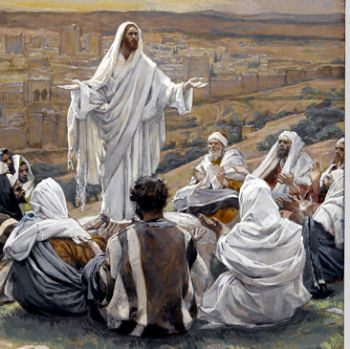The Lord's Prayer (also referred to as the "Our Father" by Catholics) was given during Christ's well-known Sermon on the Mount. Surprisingly, these words are recorded in only one of the gospels (Matthew 6:9 - 13), all of which take up only five Biblical verses. A similar, but not exact, version of these verses is given by the Lord at a different time (Luke 11).
The Matthew 6 version of the prayer was given after he chose twelve men to be his apostles (Luke 6:12 - 16) and was offered to a large and diverse crowd of people (Luke 6:17). The Luke version of the prayer was given by the Lord in response to a disciple wanting to be taught how to talk to God (Luke 11:1).
When Was It Given?
It was shortly after Pentecost was celebrated on June 1 in 27 A.D. that Jesus gave the sermon that contained the verses in question. The physical place this message was likely spoken from was Mount Eremos, which is positioned on the northwestern shore of the Sea of Galilee. The Lord picked this location, which overlooks the plain of Gennesaret, because it allowed a large group of people to hear what he had to teach.

The Lord's Prayer he gave is unique in that it delineates, directly from one member of the Godhead (the Son), how the other member of the Godhead (the Father) should be approached. It is also noteworthy because it was spoken in the middle of a message that, for the first time, more fully revealed the New Covenant (its requirements, blessings, etc.) offered to all humans.
Our Father
The Lord's Prayer begins with the following.
Our Father Who is in heaven, hallowed be Your name (Matthew 6:9, HBFV throughout).
This introduction reveals that our communications with the Eternal should begin with the recognition that he not only made us but that our relationship to him is that of family.
Something that is hallowed means it is holy and pure. Our desire ought to be that everyone revere and worship the Father because he justly deserves such a response. It should also be noted that the Lord's opening statement in verse 9 confirms that the third commandment (Exodus 20:7) was, and still is, in force for Christians.
You Kingdom Come
The second verse of the prayer the Lord gave to his disciples states the following.
Your kingdom come; Your will be done on earth, as it is in heaven. (Matthew 6:10).
Believers should earnestly desire the righteous reign of God's kingdom upon the earth, which will be manifested when the Lord returns in the end time.
We are also to pray, according to the Lord, that God's perfect will be done on earth. His will, of course, is always carried out in heaven by his angels. Our prayer should be, that since his will always seeks the best outcome for everyone, it should be zealously performed among humans.
Give Us Bread
The third verse of the Lord's outline for prayer is the following.
Give us this day our daily bread. (Matthew 6:11).
This is the first request, in this model prayer from the Lord, for something we need. When we talk to our Father, we ought to acknowledge that He makes possible every moment of our life. We always should be mindful that we are fully dependent on him.
Forgive Us!
The fourth verse of the Lord's prayer is the following.
And forgive us our debts, as we also forgive our debtors. (Matthew 6:12).
This is a variation of the "Golden Rule" teaching that states we should treat others as we would like to be treated (Matthew 7:12). In this case, we are asking God to forgive us as much as we forgive others, a principle reiterated by the Lord in Matthew 18.
Since we need all, not just some, of our sins forgiven in order to be saved, Matthew 7:12 reminds us that we are to strive to possess the same merciful character as our Maker.
Protect Us from Evil
The fifth and final verse of the prayer the Lord gave in Matthew 6 states the following.
And lead us not into temptation, but rescue us from the evil one. For Yours is the kingdom and the power and the glory forever. (Matthew 6:13).
God is not tempted by or tempts anyone with sin. This verse from the Lord encourages us to ask our heavenly Father to protect us from the devil and his subtle deceptions so that we are not destroyed spiritually.
The last part of Matthew 6:13 is the only repetition found in Jesus' model petition. While verse 10 recognizes the need for God's righteous rule on the earth, verse 13 acknowledges that He is the sole power source of his Kingdom and the owner of all things.
A Warning
Jesus gave what is commonly referred to as the Lord's Prayer, with its rich meaning, as an outline regarding how we should communicate with our heavenly Father. It was never meant to be repeated mindlessly or used like an incantation to try and "force" God to give us what we want. Jesus himself warns us in Matthew 6:7 that it is useless to repeat ourselves thinking it will help our petitions.